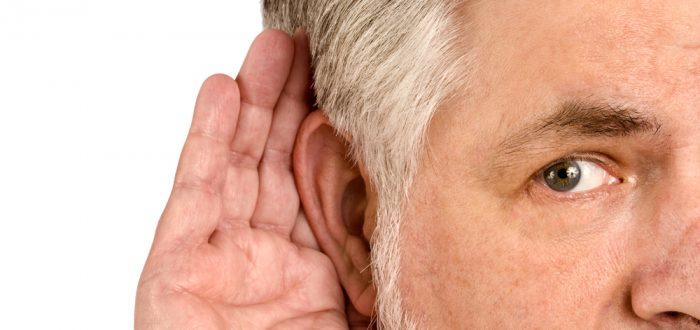In the United States, approximately 20% of Americans, or roughly 65 million people report some degree of hearing loss. Hearing loss can occur at any stage in life, from infants who are born with hearing loss up to elderly adults who suffer from gradual hearing loss. The chances are high that hearing loss has either impacted you directly, or has directly impacted someone that you know.
There are three main forms of hearing loss: sensorineural, conductive, and mixed. Conductive hearing loss happens when a blockage in your eardrum, muscles, ligaments or bones in the middle ear prevents sound waves from passing through to the inner ear. This results in a hearing loss. Sensorineural is the most common form of hearing loss that occurs as we age. A mixed hearing loss is a combination of both.
Today, we’re taking a closer look at sensorineural hearing loss.
What is Sensorineural Hearing Loss?
Sensorineural hearing loss (or SNHL) is a hearing loss that is the result of damage to your inner ear. It is estimated that 9 out of 10 forms of hearing loss are sensorineural. Sensorineural hearing loss is the most common form of hearing loss. In most cases, surgery or medicine cannot fix SNHL. Hearing aids, however, can help improve your ability to hear.
What Causes Sensorineural Hearing Loss?
The causes of SNHL can generally be sorted into two categories: acquired or congenital. Congenital hearing loss is rare. It is a form of sensorineural hearing loss that develops during pregnancy. There are a number of causes, including maternal diabetes, prematurity, genetics, and more.
The majority of people have acquired SNHL. Acquired SNHL is a hearing loss that has developed over time. Common causes include:
- Aging – Age related hearing loss, or presbycusis, affects one in three Americans between the ages of 65-74.
- Noise – Noise induced hearing loss, or NIHL affects 1 in 4 U.S. adults between the ages of 20-69. Prolonged or sudden exposure to dangerous noise is a common cause of hearing loss.
- Illness – Viral infections, such as mumps or meningitis, can in some cases cause sensorineural hearing loss.
- Medications – Some medications are known to result in patients experiencing a hearing loss or tinnitus. These medications are known as ototoxic.
- Injury – Your inner ear may be damaged by a blow to the head. This can result in SNHL.
What Are The Symptoms of Sensorineural Hearing Loss?
Sensorineural hearing loss makes it difficult to hear quiet sounds. It also diminishes the clarity of sounds that you hear. Common symptoms of sensorineural hearing loss include:
- Sounds appear muffled
- Struggling to follow conversations in a group setting
- Tinnitus
- Difficulty hearing high-pitched sounds
- Dizziness or imbalance
Is Sensorineural Hearing Loss Treatable?
Currently, there are no surgical or medicinal options to treat sensorineural hearing loss. Hearing aids can help improve your ability to hear. To minimize the impact that SNHL can have, it’s important to take steps to protect your hearing, and to stay on top of your annual hearing assessments.
Early detection of a hearing loss is the best way of mitigating the impact that it can have on your quality of life. Regularly hearing assessments are the best way to stay on top of your baseline hearing. If you’re due an assessment, please get in touch with the hearing professionals at Anderson Audiology. Call us today on 702-997-2964. Alternatively, click here to request an appointment online.

